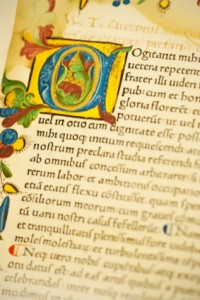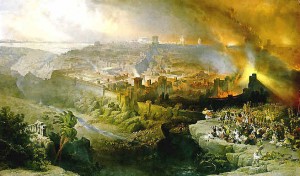 The Bible is certainly the most valuable book in the kingdom of God. It’s the law book of the kingdom, the King’s revelation of Himself and a guidebook for living. And if we were to do a poll of the citizens of the kingdom of God, I suspect we would have near unanimity on this point. But even non-Christians have to admit the Bible is the most valuable book in the world. Not just any Bible but the Gutenberg Bible.
The Bible is certainly the most valuable book in the kingdom of God. It’s the law book of the kingdom, the King’s revelation of Himself and a guidebook for living. And if we were to do a poll of the citizens of the kingdom of God, I suspect we would have near unanimity on this point. But even non-Christians have to admit the Bible is the most valuable book in the world. Not just any Bible but the Gutenberg Bible.
Johannes Gutenberg was born in the German city of Mainz in 1398. He later moved to Strasbourg. At the time, books were only owned by the wealthy because they were very expensive. Books had to be copied by hand, and it would take a monk, for example, a year to copy one Bible. You can imagine then the relative cost of purchasing it or any other book. Gutenberg’s dream was to produce a machine that would enable him to produce books much faster and cheaper so common people could afford to buy and read books.
Gutenberg experimented with different ideas, ultimately settling upon the idea of using moveable metal letters that could be set up in a page format, inked, pressed to paper or vellum to mass produce a page, and then rearranged to print a different page. This was a big leap from hand-copying or using a single carved wooden block to create a page of type.
In 1455, Gutenberg printed a full Latin Bible, about 180 copies, some in paper and some in vellum. The world would never be then same. The printing press made the Protestant Reformation possible because it made the word of God accessible to the common man, not just the wealthy and the clergy. The printing press is the reason you can read your Bible in the privacy of your home before going to work rather than waiting to have a priest or pastor read it to you on Sunday morning. The printing press aided the expansion of the kingdom of God like no other invention in history.
Now here’s the rest of the story. Gutenberg had borrowed money from a wealthy attorney named Fust to finance his printing press business. When Fust suspected Gutenberg was using the money for something other than his business, he sued, won and received as part of the judgment Gutenberg’s Bible printing workshop and half of all the printed Bibles, leaving Gutenberg essentially bankrupt. Sounds like Fust was a pretty good lawyer.
Today, there are 21 complete Gutenberg Bibles still in existence. The estimated value of a Gutenberg Bible on the open market is $25-$35 million, making it the most valuable book in the world. What’s ironic is that Gutenberg set out to create a Bible affordable to the common man, and in so doing he created the most expensive book in the history of mankind. GS




